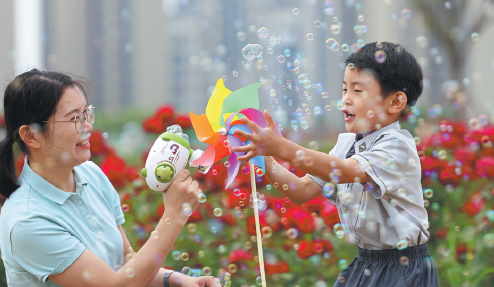Great parenting is all about finding the right balance
Disagreements, compromises are part of what make kids understand how life works

Editor's note: In a society once renowned for its "tiger parenting", a shifting cultural landscape is emerging as more moms and dads embrace alternative, relaxed approaches to child rearing. The following three narratives capture this evolving dynamic and reflect a growing trend toward healthier parent-child relationships in China.
Luo Peng, 42, a nature educator in Beijing
All of those who know my son say that his smile is particularly infectious and healing. Raising him for nearly seven years, I have also gained countless strengths in growing up with him, just as he said: "Mom, I am your mobile charging station."
As a mother, I accept my son as he is. A mother must have eyes to discover these traits. Instead of being anxious because of others' judgments, it is better to spend more time and energy observing and understanding my own child.
My son's piano teacher once told me that he is so great and that he should keep it up, who knows what achievements he will make? It suddenly occurred to me how brilliant his piano playing could be one day. And in that instant, it dawned on me that I was about to get caught up in this subconscious competition.
There are too many outstanding children around us in various aspects, with rich vocabularies and fluent in poetry and literature. When we only see the good displayed by others and compare, anxiety is bound to arise. Learning the piano can help us better enjoy music, it's not important to achieve a certain level of proficiency.
Really respecting my child is about respecting his choices, treating him as an individual. It is not about pretending to respect him in order to achieve a parent's goal. Parents need to genuinely respect children from the heart. Specifically speaking, I let my son make a choice first and accept it if it's within my ability, but refuse those beyond my reach. It's okay to say no.
Great parenting is not about everything going smoothly all the time. It's about disagreements, arguments and then resolutions. In this process, the relationship between us becomes stronger and more resilient. In this way, I provide my son with a sense of security, which means that an argument won't affect the relationship.
Whenever I feel my mother's love, I always feel that behind it is more of an expectation. For example, I mustn't drag my feet while walking, can't make noise while eating and I must have a good academic performance. When I was a child, I was obedient and did well in my studies. But from a young age, when I was being disciplined by her, there was a voice in my heart that spoke of my rebellion. I would always think, when I become a mother, I will never be like this.
I think between two generations, we can't say who's at fault. We are limited by circumstances and mindset. There's no blame in this issue. I never blame my mother for not giving me enough maternal love. I've never been one to play the victim. Without a victim mentality, I can solve the problem and continue to create something new.
Children are more self-disciplined than we adults think. For example, I explain to my son the potential impact of sugar on his health and teeth. So, we have designated every Saturday as "sugar day". He can eat as much as he wants on that day, but no sugar on other days.
At just over 2 years old, he started asking what day it was. You can't be too rigid with rules. I asked him if he really wanted it. If yes, okay, have it today, but no more on Saturday. I was creating a framework of rules for him. Within that, I don't need to manage every detail. He might slip up once or twice. But after you discuss the consequences with him, he'll be better at self-control.
Even if he tells me in the future that he doesn't want to go to college, I'm okay with that. It's hard to say that children from top schools are always happy or successful. Life is about experiences, about creating, not about achieving a specific outcome. I see the light in my son's eyes, happiness, curiosity, gentleness and empathy. He's very good at discovering and solving problems. These qualities are enough for him to lead a wonderful life, a life where he can create.
Why does he have to live in a big city? Why does he have to work? I would think it's great even if one day he tells me he wants to go to the mountains to herd sheep.
If a job is just about having money to sustain your life or a high-quality life, why isn't life the focus? We've got it all mixed up. Do you want a good life or a good job? If it's a good life you want, there are so many ways to achieve it.
If we set the end goal as being an elite in a big city as providing a good life, this misplaced focus will inevitably lead to anxiety. It's hard to imagine that in 20 years, our next generation will have the same jobs we do now. It's even possible that they won't need jobs and will still lead meaningful and happy lives. Many things can be assisted by artificial intelligence. The most important thing for children that cannot be replaced is the curiosity and problem-solving abilities they have from a young age. I think the reason why so many parents struggle with tutoring and homework is that they've got it wrong. Who is responsible when things go wrong? The responsibility for homework lies with the child, not the parent.
Luo Peng spoke with Li Hongyang.

Today's Top News
- Unified national market a new growth launchpad
- US deal a structural challenge for Japan
- Industrial prowess of China a subject of serious study
- US new tariffs 'unfair': Experts
- NDRC recalibrating steps to drive growth, boost demand
- Wartime hero's legacy fortifies Sino-UK bond






























